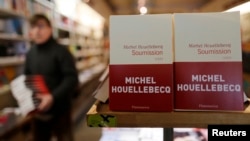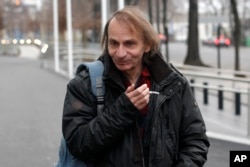As France reels from recent back-to-back terrorist attacks, a biting fictional novel about France under Sharia law went on sale in bookstores this past week has become part of a debate about the country's very identity.
The Gibert Jeune book store in downtown Paris is almost empty on a recent evening. A few people wander through the literature section. But a pile of books with red and white covers is left untouched … until Jacqueline Buades makes a beeline for it.
Buades likes the author, Michel Houellebecq. He talks about Islam, a topic that resonates with Buades, who was born in Algeria to a Jewish mother. She likes his spirit. He likes to provoke, she says, and she, too, is a rebel.
Houellebecq's latest novel -- the stack in the bookstore -- is called Soumission, or Submission in English. Even before its publication last week, it was generating publicity. It's set in France in 2022, when a fictional Islamist party wins the presidential elections.
Controversial author
Houellebecq has sparked controversy before. He's been sued,and acquitted, on grounds of inciting racial violence. He once called Islam the "stupidest faith" -- although he's recently softened his stance, saying the Quran isn't so bad after all.
But Submission's publication was sidelined by a bigger event. It hit French bookstores on the very day that Islamist extremists attacked the Paris offices of Charlie Hebdo magazine.
Houellebecq, who was making the media rounds to promote his novel, briefly disappeared from public view.
But in an interview on French TV the night before the attacks, Houellebecq said the scenario of a moderate Islamist party taking power in France is a real possibility. In his book, France under Sharia turns out to be not so bad.
Houellebecq says the first part of Submission can make people scared. But the Islamist who comes to power is first and foremost a politician. He's a very ambitious man and a talented one.
With last week's terrorist attacks, the worst French fears of Islamic extremism have become reality. But the attacks have also sparked an extraordinary show of solidarity.
As the nation moves forward, Houellebecq's book is part of a central question: Will it respond to militant Islam with fear and xenophobia. Or by embracing its multicultural and multifaith identity?
Unity march
Last Sunday, unity was on display as several million French rallied around the country in support of free expression and against extremism.
In Paris, the protesters included 17-year-old Amina Tadjouri, who showed up with a copy of a Jewish newspaper.
"I'm Muslim, and I'm not OK with these killings. Jews and Muslims refuse to be enemies. And we refuse to let people be killed for free expression," Amina said. "Everyone should be allowed to say what they want."
French leaders are echoing that message of inclusiveness. "France is not Houellebecq," Prime Minister Manuel Valls said last week, "it's not intolerance, hatred and fear."
Critics say Houellebecq's books -- like Charlie Hebdo's religious cartoons -- push the limits of free speech. The magazine published its first edition since the attacks on Wednesday, again spoofing the Prophet Muhammed. It sold out within hours.
Defne Gursoy was searching Paris newsstands for a copy of Charlie Hebdo. She's a regular reader. She's not a fan of Houellebecq's books, but in both cases, she says, free expression is on the line.
"In fiction -- this (Charlie Hebdo) is fiction as well, Houellebecq is fiction. … In fiction, the sky's the limit. There's no limits. The beauty about fiction is that you can do anything," Gursoy said.
Fear backlash
But many mainstream Muslims are fearful of a backlash after last week's events.
Abdallah Zekri, who heads the National Observatory Against Islamophobia, says dozens of mosques and other Islamic symbols have been attacked in recent days.
Zekri says both Houellebecq's novel and Charlie Hebdo are further provocations.
He says French Muslims are sick of being stigmatized, he says they're tired of being scapegoats for everything that happens.
Referring to Houellebecq's scenario of France under Muslim leadership, Zekri's answer is: Why not?
"The U.S. has a black president under Barack Obama," he says, "so what's the problem with electing a Muslim president in France?"
Observers agree Houellebecq's book taps simmering anxieties and prejudices of French citizens like Francklin Boulot, who attended Sunday's rally not to support free expression - but to protest the Muslim faith.
Boulot says Islam wants to destroy French society. It's doing everything to kill us, he says.
So tensions are again on the rise in France - suggesting the rare unity on display after last week's attacks could already be fading.





